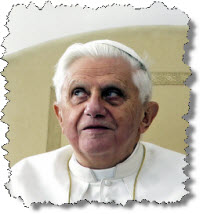No. The Code of Canon Law has no provision that allows a pope’s removal from office- for any reason, even poor health or psychological trauma. That’s because, according to church law, there is no higher authority than the pope: He “possesses supreme, full, immediate, and universal ordinary power in the Church, which he is always able to exercise freely.”
A pope may resign, but his resignation must be “made freely,” and Question: he doesn’t have to tender his resignation to any particular authority.
The last time that happened was in 1415, Pope Gregory XII.
 Can the pope face prosecution under secular law?
Can the pope face prosecution under secular law?
No. The pope is immune from prosecution under the local laws of the Vatican. It’s also a principle of customary international law that heads of state enjoy immunity from prosecution. That includes the pope, who is both the head of the church and the head of Vatican City.

What I want to know is, does he crap in the woods?
this is why they are poisoned.
he looks like the Emperor in star wars
If anyone else behaved the way the Pope behaved then they would go to prison.
http://www.independent.co.uk/opinion/commentators/johann-hari/johann-hari-the-pope-the-prophet-and-the-religious-support-for-evil-1923656.html
There is an authority in the Catholic church that possesses power at least equal to that of the pope: the Ecumenical Council. The decrees of an Ecumenical Council have a force like that of Papal dicta, and they constitute the canon law by which the Pope governs. The Councils write the laws. So the Pope is supreme within the law, but the Council is supreme over the law. As a result, a Council can remove a pope. In fact, it’s happened several times: The Councils of Pisa, Constance, and Basel all fired one pope or another.
So, yes, the Pope can be fired.
So the Ecumenical Council can cause the parting of the Holy See?
The Pope’s on the ropes?
All jokes aside, there is a LOT of evidence to suggest that the Pope’s position should be in question.
Maybe the Roman Catholic Church should remove the Pope and return back to the teachings of the Bible instead of considering their traditions are as important as the Bible.